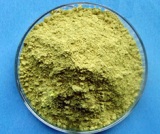 Quercetin is one of the most ubiquitous flavonoids found in many fruits, vegetables, nuts, and red wine, and exerts anti-inflammatory and anti-carcinogenic activities. Research shows that quercetin may help to treat and prevent colon cancer. Quercetin can affect growth of colon cancer cells by both decreasing polyamine biosynthesis and inducing apoptosis. Polyamines are involved in cell growth and differentiation.
Quercetin is one of the most ubiquitous flavonoids found in many fruits, vegetables, nuts, and red wine, and exerts anti-inflammatory and anti-carcinogenic activities. Research shows that quercetin may help to treat and prevent colon cancer. Quercetin can affect growth of colon cancer cells by both decreasing polyamine biosynthesis and inducing apoptosis. Polyamines are involved in cell growth and differentiation.
The Wnt signaling pathway plays a pivotal role in cellular developmental processes and human carcinogenesis. Inhibition of expression of cyclin D(1) and survivin as well as the Wnt/beta-catenin, p21-RAS signaling pathway could be qualified as promising targets for innovative treatment strategies of colon cancer. Quercetin inhibits these pathways. Moreover, Quercetin activates AMPK (AMP-activated protein kinase), a physiological cellular energy sensor, through ROS …